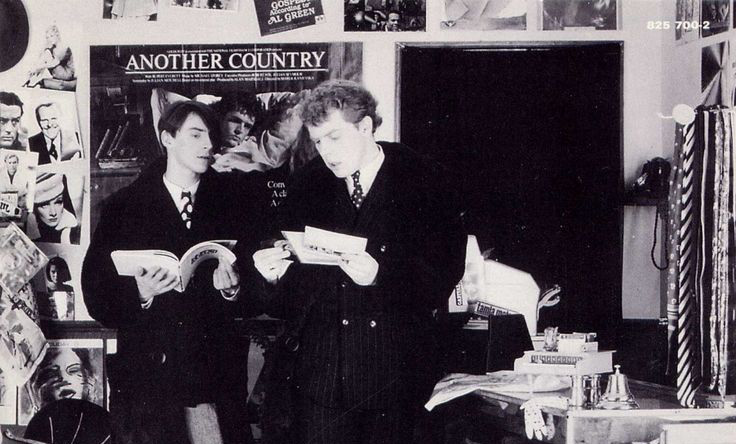
In 1982 Paul Weller the front-man of The Jam surprised many by announcing the band’s dissolution. There were many reasons why The Jam ended. The foremost reason for Weller, was that he thought the band had reached a dead end with their sound and that they had entered a sort of cul-de-sac they could not escape. The straight jack of expectations had stifled the band and the only seemingly available answer was to extinguish the entity. Many wondered what the next step would be for Weller, who had become a principle figure in the Mod revival of the 70’s and early 80’s. The “Modfather” as he is known wanted to expand his horizons adding jazz and soulful R&B stylings and marry it to pop in his next project.
In 1983 he would team up with keyboardist Mike Talbot, formerly of Dexy’s Midnight Runners, The Bureau and The Morton Parkas, to form the Style Council. The Style Council Rota would expand to include drummer Steve White and Singer Dee C. Lee. Over time the band would wander through a wide range of musical genres pop, jazz, soul, R&B, house and folk before Weller would move on to his solo career. The band was at the vanguard of the jazz/pop revival of the early 80’s. With the Style Council Weller would embark on another initially successful career move while remaining as ever firmly rooted in British culture. The Style Council would give Weller his first chart success in the US with the singles My Everchanging Mood and You’re the Best Thing off of Café Blue as the group entered the US Billboard 100.
Our Favourite Shop was the Style Council’s second album and the peak of their commercial success with the singles; Walls Came Tumbling Down, The Lodgers, and Boy Who Cried Wolf. It was the Style Council’s only number one album in the United Kingdom. Guesting on the album was Lenny Henry who provided the vocals for The Stand up Comic’s Instructions. Tracie Young and Alish Limerick provided backing vocals.
As a note for the other Yankees like myself; this album was released in the states under the title Internationalist and has led to some confusion over the years as those of us who adored this album could not seem to find it anywhere when looking to upgrade our original copies. I myself struggled to replace a totally worn out cassette tape for years. I finally found it under the UK released title. I can not convey how much I adore this album. I initially stumbled upon it after reading a brief Rolling Stone review that recommended it highly. The album had me from the first reading of the liner notes which contained the rantings of the Cappuccino Kid. Weller in that guise railed against the breakup of pit communities and the evils of the state’s coercive force. He abhorred the newly established Potemkin Villages that in many ways personified Margaret Thatcher’s England. This album was like nothing out there, a combination of catchy jazz, R&B soul, and pop melodies chained to barbed lyrics that seemed somehow apt even if you were located an ocean away.
Our Favourite Shop was an overtly political album driven by the age of Thatcher. The lyrics attacked racism, excessive commercialism, self serving governments, and a disappointment at the exasperating lack opposition to the status quo. The album was a fine balancing act between pessimistic insights and an overarching sense of hope, delight and the idea that alternatives existed.
The album starts off with Housebreakers which was a pull no punches indictment of the UK government. It excoriates the powers that be for the lack of jobs throughout the country that leads to the break up of homes. On full display was the lack of support for youth who either wallowed in joblessness on the dole or left their families to look for employment. These youth headed to cities hopeful to land a job any job. It examined the self loathing of not meeting the standard, “I should be on my way, I should be earning pay, I should be all the things that I’m not.” The track also asked the unavoidable question of who was truly at fault for what was happening. The song conveys the sadness of the break up of families starting with the teary departure at the train station, emphasized by the gritty marriage of the Hammond organ, horns and British Soul. Weller goes on to paint a story of economic hard times; “I’ve tried on my own, now there is nothing to keep me at home, all the love and strength had been taken by this government, you see they tell you move around , if you can’t find work in your own town.” The song put the listener on notice that they were to prepare to receive Weller’s State of the UK.
All Gone Away was an upper cut punch following up Housebreakers. It continued the theme of “Housebreakers” with the economy causing disconnects with former ways of life. At the time people were encouraged to leave behind the small towns and villages that are the backbone of Britain. The song discusses forcing people into sterile government council housing that bred more problems than answers. Weller felt rightly that it would all end in tears. The song on the surface was all light and pleasing with the playful samba beat and flute which masked Weller at his most biting. The final verse nails the message with its cheeky wry, typical British stiff upper lip delivery; “come take a walk upon these hills and see how monetarism kills whole communities even families there’s nothing left so they’ve all gone away.” Brilliant!
Come to Milton Keyes completes the trilogy of dissociative displacement and further displayed what ended up happening when entire communities were up rooted due to the economic scenarios in the late 70’s and 80’s. The problems didn’t go away just because people were relocated through government schemes, but in many cases concentrated and created more problems. “Let us share our insanity, go mad together in Community, boys on the corner looking for their supper, boys round the green looking for some slaughter.” Weller pointed out Milton Keyes as a prime example of a manufactured Potemkin village where as long as you turned over no stones it looked lovely, but lurking underneath were even more disturbing problems. The reality was never going to meet the expectations. The jaunty Hammond organ and light fairy tale treatment of the accompaniment belie the lyrics which ripped away the façade of happily ever after,” I was looking for a job so I came to town, I easily adapt when the chips are down, I read the ad about the private schemes I liked the idea but now I am not so Keyne.” You can feel Weller’s vitriol aimed at the pie in the sky fake happiness being fed to the sheep.
The song Internationalists was truly Weller singing his creed. It reads like a recruitment poster for those sick of the status quo. The lyrics are sung with urgent intensity and railed against racism, financial inequity, the class system and corrupt governments. “If you believe you have an equal share…If your eyes see deeper than the colour of skin…if you see the mistake in have bosses at all…rise up now and declare yourself an internationalist.” This political tract was married to a fantastic accompaniment. It is a timeless song for the disenfranchised and disaffected. A stompin rocker filled with horns, organs, kicking drums and wonky guitar.
A Stones Throw Away was a song that went from micro to macro takes a broader look at the world. The accompaniment brings down the temperature musically and becoming more elegiac. It takes a snapshot of the state of the world at that time and measured the cost of demanding human liberty. The track utilized a beautifully haunting cello and strings; it juxtaposed the beauty of the instrumentation against the violence of coercive compliance. “For liberty there is a cost, its broken skulls and leather cosh …Wherever honest persists you’ll hear the snap of broken ribs.” At the time of the song some of the worst totalitarian regimes were Chile, Poland, and Johannesburg among others, but the song could apply just as easily today to North Korean and the fascism of many Muslim countries. Weller positioned the sinner vs. the saint with an acerbic song that points out the human cost of brave protests that inch towards the ultimate goal. He ends the song on a hopeful note, “a stones throw away: now we’re there.” Weller does a spectacular job in conveying all the pain and hope expressed in the song.
The Stand Up Comedian’s Instructions almost didn’t make it on to the US release of the album. It was feared that listeners would not understand it was a satire. The song was a send up of comedians like Jim Davison and Bernard Manning. It features comedian Lenny Henry providing the tongue and cheek vocal. The comedian of the song is an equal opportunity racist. He offends just about every minority group. Weller with the song points out that there is no one as pathetic as some one who raises themselves up by mocking or putting down others less fortunate or different. Weller held up a mirror to society to show the ugliness of bigotry and how cheap and easy it is to succumb to it. Weller finally responds in his own voice at the end with the lyric ; ”I don’t know what you want from me but I know I’ll never be” and Lenny Henry’s comedian answers, “but keep em laughing don’t let it stop or the truth might catch up and spoil the plot.” The track is a forthright and satirically delivery of a universal lesson.
The Boy Who Cried Wolf was popular both in the UK and stateside and is probably the most approachable song on the album. It is a breakup song with no heavy political baggage. In the song the protagonist doesn’t realize until it is too late that his love interest is simply not coming back. He has treated her too badly once too often drawing the apt parallel to the boy who cried wolf. Weller croons his regret “that it seems I need you more each day, heaven knows why that it goes that way, now it’s far too late, and I’ve lost this time, like a boy who cried wolf.” The song has an excellent R&B styling and fantastic keyboards that make it an engaging song.
A Man of Great Promise is my favorite song on the album. It was clear from the first listen that the song was about someone who had committed suicide. It was not till years later I found out the story behind this song. It appears that a childhood acquaintance of Weller’s had taken his life and Weller found out about it by chance looking thought the paper. Shocked by the news Weller immediately wrote the song. In the song Weller uses a light and uptempo accompaniment. The lyrics speak to the feeling of wishing there had been something that could have been done to stop the person. Weller wonders how things got so bad., “And I think of what you might have been, a man of such great promise, oh but you seem to forget the dream and the more you saw you hated.” The subject in question is portrayed as a once shining boy who was dragged down by his surroundings and bad decisions, “but you were always chained and, shackled by the dirt of every small town institution and every big town flirt.” The song ends with Weller wondering if the friend would do it again, or regretted his decision. The song is breathtaking in the clarity of understanding the draw of suicide and the ever present guilt of those who survive the victim. The song shows all the brilliance of Weller’s songwriting and is dramatic and poignant.
From the sadness of A Man of Great Promise the album turns to Down the Seine a song so bright and sunny it seem out of place on the album but is a needed respite after the dark and sad topics prior. The song is about falling in love and the manic highs and lows of one’s emotions. The song itself has a very French feeling, set by the accordion and piano along with Talbot’s Hammond organ and Weller singing partly in French. It is Paris on a gorgeous day while falling headlong into reckless happiness.
From that brief interlude we head back to politics with The Lodgers (or she was only a shopkeeper’s daughter). The subtitle was a knock on Margaret Thatcher and her origins. The song was a scathing attack on the class system and the lies told to keep present society together. “There’s only room for those the same, those who play the leeches game. Don’t get settled in this place the lodger’s terms are disgrace.” Thorough different settings Weller attacks the central lie, which he saw as if you play along and tow the line you would come out on top. Society requires you to sell your integrity for the chance. Dee C. Lee who is brilliant on the entire album really shines on this track, and there is a stellar jazz interlude that is not to be missed. The track is a brilliant juxtapostioning of the commonly offered doggerel and reality. “The Lodgers” is Weller begging for some kind of wake up call and change.
Luck again turns to love in a respite from all the woefulness of the world. It is a beautifully earnest song with Weller and Dee C. Lee bobbing and weaving vocally displaying how redeeming love is as they were personally falling in love. It is a pure delight and showed that Weller was not a complete curmudgeon. It is bouncy and a breathless legal high; “Luck when you hold me closely ooh feels like summertime luck when you hold my hand I want it all the time.”
Again the album veers to the political. With Every Thing to Lose took up the topic of everything turned upside down for the blue collar and working poor youth whose dreams and promise end at graduation. The song called on those afflicted to join together and demand change. The track offers a spot on description of the young generation being offered empty promises. “From the playground to the waste ground hope ends at 17.” Again the samba/rap like selection with jazz and flute sounded light as the lyrics pile drive the seriousness of the theme to the listener. Weller is venomous as he sings the lyric as apt today as then,” a family lost for a few pounds saved.” The song depicted the poor being offered shiny shillings while those in charge ran off with the wheel barrow of dirty pounds. Weller decried “the band aids on bullet holes” mentality of the government in a cleverly subversive style.
Our Favourite Shop the title song was a funky keyboard instrumental and very throwback to feel of The Jam. It is a cool cat instrumental with a great horn section.
Walls Come Tumbling Down was another popular single off the album. It is a rousting call to wake up and do something. “You don’t have to take this crap, you don’t have to sit back and relax, you can actually try changing it.” The song decried materialism and its use as an opiate and enslavement tool. It is a clarion call conveying the idea of debt being used to keep you on the hamster wheel. The song was intense and urgent and catchy as hell. It called out the power plays of the government, “are you gonna be threatened by the public enemies number ten, those who play the power game, they take the profits you take the blame, then they tell you there’s no rise in pay.” These lyric sounds like they should be the motto of the current junior physicians of the NHS. Unfortunately I wish ‘Walls” was not such a timeless song.
The companion song to “Walls” is Shout to the Top. Again this is another song demanding power for the people. It attempted to inspire people to not be silenced but to be heard and shout just a little louder. The song’s lethal sonic combination of rollicking strings and piano makes it so effective. “When your knocked on your back and your life’s a flop when your down on the bottom there is nothing left but to shout to the top.” It is a hope filled protest song and simply brilliant.
As the 80’s went on The Style Council’s popularity would recede and the death knell was sounded in 1989 when the record label refused to release the 5th Style Council album, Modernism:/A New Decade. That release was a wide departure from the original sound of the band and went into a house influence. In 1989 Weller announced the end of The Style Council and “Modernism” except for a limited vinyl run would not be available until 1998.
Despite the eventual down turn in fortunes for The Style Council Our Favourite Shop is an amazing examination of British society and the universal desire for freedom and equality. Weller and Co. hit this album out of the park. It is engaging, and intelligent. Whatever your political bend “Our Favourite Shop” was a mirror held to society showing the ugly reality of Thatcher’s England. The prophet like vision of Weller on this disc is breath taking. The album is also superb sonically as Weller and Talbot produced a spellbinding amalgam of Jazz, R&B, and Soul loaded with pop sensibilities. In an era when getting preachy on an album was not a bad thing, Our Favourite Shop is certainly at the head of the class in producing a persuasive call for political and social change. It is no small leap to say that The Style Council is the forerunner of groups like the Sleaford Mods and their ilk who laser pointer the problems that exist and have remained intransigent since this album. It is well worth tracking down Our Favourite Shop and giving it a listen.





Be the first to comment